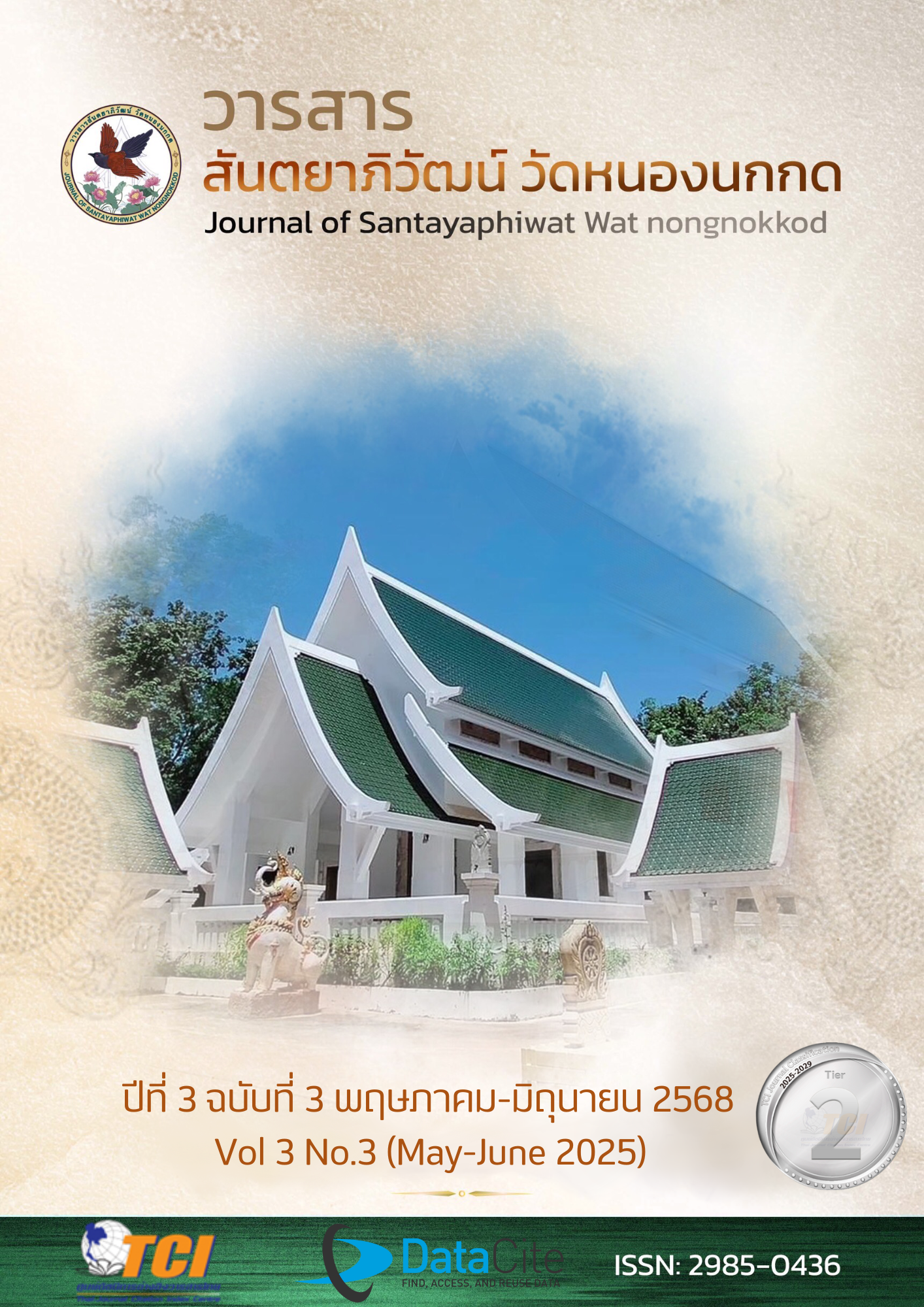ภาวะผู้นำเชิงวิสัยทัศน์ของผู้บริหารสถานศึกษา ในสังกัดสำนักงานเขตพื้นที่การศึกษาประถมศึกษาเลย เขต 2
คำสำคัญ:
ภาวะผู้นำเชิงวิสัยทัศน์ , ผู้บริหารสถานศึกษาบทคัดย่อ
การวิจัยครั้งนี้จึงมีวัตถุประสงค์ 1) เพื่อศึกษาระดับภาวะผู้นำเชิงวิสัยทัศน์ของผู้บริหารสถานศึกษา 2) เพื่อเปรียบเทียบความคิดเห็นของครูและผู้บริหารต่อภาวะผู้นำเชิงวิสัยทัศน์ของผู้บริหารสถานศึกษา 3) เพื่อศึกษาแนวทางการพัฒนาภาวะผู้นำเชิงวิสัยทัศน์ของผู้บริหารสถานศึกษา สังกัดสำนักงานเขตพื้นที่การศึกษาประถมศึกษาเลย เขต 2 โดยจําแนกตาม เพศ ตําแหน่ง ประสบการณ์การทํางาน และขนาดของสถานศึกษา กลุ่มตัวอย่างที่ใช้ในการวิจัย ได้แก่ ผู้บริหารสถานศึกษาจำนวน 47 คน และครูจำนวน 255 คน รวมเป็น 302 คน ได้มาโดยการสุ่มแบบแบ่งชั้นภูมิ เครื่องมือที่ใช้ ได้แก่ แบบสอบถาม มีความเชื่อมั่น 0.949 วิเคราะห์ข้อมูล โดยหาร้อยละ ค่าเฉลี่ย ส่วนเบี่ยงเบนมาตรฐาน การทดสอบค่าที
ผลการวิจัยพบว่า
- ภาวะผู้นำเชิงวิสัยทัศน์ของผู้บริหารสถานศึกษา สังกัดสำนักงานเขตพื้นที่การศึกษาประถมศึกษาเลย เขต 2 โดยรวมอยู่ในระดับมาก
- เปรียบเทียบความคิดเห็นของครูและผู้บริหารต่อภาวะผู้นำเชิงวิสัยทัศน์ของผู้บริหารสถานศึกษา สังกัดสำนักงานเขตพื้นที่การศึกษาประถมศึกษาเลย เขต 2 จำแนกตามอำเภอที่ตั้งของโรงเรียนโดยภาพรวมแตกต่างกันอย่างมีนัยสำคัญทางสถิติที่ระดับ .05
- แนวทางการพัฒนาภาวะผู้นำเชิงวิสัยทัศน์ของผู้บริหาร สังกัดสำนักงานเขตพื้นที่การศึกษาประถมศึกษาเลย เขต 2 ที่สำคัญคือ ด้านการสร้างวิสัยทัศน์ ผู้บริหารควรมีแนว ทางการปฏิบัติที่บรรลุผลสำเร็จ และสอดคล้องกับบริบทสภาพแวดล้อมของสถานศึกษา ศึกษาค้นคว้า ริเริ่ม สร้างสรรค์ความรู้ใหม่ทันสมัยต่อเหตุการณ์ในยุคปัจจุบัน ด้านการเผยแพร่วิสัยทัศน์ผู้บริหารควร สื่อสารให้ครูและผู้ที่เกี่ยวข้องเข้าใจถึงวิสัยทัศน์ของสถานศึกษาได้อย่างชัดเจน และปฏิบัติหน้าที่อย่างเต็ม กำลังความสามารถ ด้านการปฏิบัติตามวิสัยทัศน์ผู้บริหารสถานศึกษาควรส่งเสริมให้ครูและบุคลากรให้ สามารถทำตามวิสัยทัศน์ของสถานศึกษาทำงานเป็นทีมยึดมั่นในวิสัยทัศน์ของสถานศึกษาสู่การพัฒนาและ เปลี่ยนแปลงสถานศึกษาไปในทิศทางที่ดีขึ้น ด้านการเป็นแบบอย่างที่ดีผู้บริหารสถานศึกษาควรส่งเสริม ให้ครูเป็นผู้เสียสละ เอื้ออาทร มีความรัก ความสามัคคี และร่วมใจกันผนึกกำลังในการพัฒนาการศึกษา
เอกสารอ้างอิง
วัชรินทร์ ต่อชีพ. (2567). ภาวะผู้นำเชิงวิสัยทัศน์ของผู้บริหารสถานศึกษา สังกัดสำนักงานเขตพื้นที่การศึกษาประถมศึกษาชัยภูมิ เขต 1. ใน การค้นคว้าอิสระครุศาสตรมหาบัณฑิต สาขาวิชาการบริหารการศึกษา. มหาวิทยาลัยราชภัฏชัยภูมิ.
รัตนา ดวงแก้ว. (2564). รูปแบบการพัฒนาภาวะผู้นำเชิงวิสัยทัศน์ของผู้บริหารโรงเรียน มัธยมศึกษา. วารสารศึกษาศาสตร์ มหาวิทยาลัยนเรศวร, 23(2), 112-126.
ทักษิณ มวลมนตรี. (2564). ความสัมพันธ์ระหว่างภาวะผู้นำเชิงวิสัยทัศน์ของผู้บริหารโรงเรียนและแรงจูงใจในการปฏิบัติงานของครู สังกัดสำนักงานเขตพื้นที่การศึกษาประถมศึกษามุกดาหาร. วิทยานิพนธ์ปริญญาครุศาสตรมหาบัณฑิต สาขาวิชาการบริหารการศึกษา. มหาวิทยาลัยราชภัฏสกลนคร.
ศุภวัฒน์ แย้มจรัส. (2564-2567). รูปแบบการพัฒนาภาวะผู้นำเชิงวิสัยทัศน์สำหรับหัวหน้ากลุ่มสาระการเรียนรู้ในสถานศึกษาสำนักงานเขตพื้นที่การศึกษามัธยมศึกษาสุราษฎร์ธานี ชุมพร ในจังหวัดสุราษฎร์ธานี
วิโรจน์ สารรัตนะ. (2564). ภาวะผู้นำ: ทฤษฎีและนานาทัศนะร่วมสมัยปัจจุบัน. กรุงเทพฯ:
สิงห์คำ ยอดปานันท์. (2562). ภาวะผู้นำเชิงวิสัยทัศน์ของผู้บริหารสถานศึกษาที่ส่งผลต่อการบริหารการเปลี่ยนแปลงในสถานศึกษาสังกัดสำนักงานเขตพื้นที่การศึกษามัธยมศึกษา เขต 38. ใน วิทยานิพนธ์ ปริญญาศึกษาศาสตรมหาบัณฑิต สาขาวิชาศึกษาศาสตร์. มหาวิทยาลัยสุโขทัยธรรมาธิราช.
รัตนา คนไว. (2565). ภาวะผู้นำเชิงวิสัยทัศน์ของผู้บริหารสถานศึกษาที่ส่งผลต่อประสิทธิผลการปฏิบัติงานของครูในโรงเรียน สังกัดสำนักงาน เขตพื้นที่การศึกษามัธยมศึกษามุกดาหาร. ใน วิทยานิพนธ์ปริญญาครุศาสตร์ มหาบัณฑิต สาขาวิชาการบริหารการศึกษา. มหาวิทยาลัยราชภัฏสกลนคร.
สุเทพ พงศ์ศรีวัฒน์. (2564). ภาวะผู้นำทางการศึกษา. (พิมพ์ครั้งที่ 2). เชียงราย: มหาวิทยาลัยราชภัฏเชียงราย.
Krejcie,R.V.,& D.W.Morgan. (1970). Determining Sample Size for Research Activities”. Educational and Psychological Measurement, 30(3),607 – 610.
Harris & Jones, 2024. (2024). Productive teacher job satisfaction: Disentangling organizational climate, facility management, and organizational citizenship behavior. Postgraduate Study Management of Education, Universitas Negeri Jakarta, Indonesia
Bass, B. M., & Riggio, R. E. (2023). Transformational leadership. (3rd ed.). New York: Psychology Press.
Bush, T. (2024). Leadership and management development in education. (5th ed.). London: SAGE.
Harris, A., & Jones, M. (2024). Leading in disruptive times: Principal professional learning in the digital age. School Leadership & Management, 44(1), 1-15.
Leithwood, K. (2023). Leadership for school improvement: A review of international research. Studies in Educational Leadership, 25(2), 45-62.
Robinson, V. (2024). Student-centered leadership. (3rd ed.). San Francisco: Jossey-Bass.
UNESCO. (2023). Education in a post-COVID world: Nine ideasfor public action. Paris: UNESCO Digital Library









